There are so many articles with views, commentary, and perceptions on what makes a good team. The Web, Facebook, and LinkedIn all have expert views on this. Rarely though, is there real evidence gathered on why a team performs so much better than others. Such insights are critical for our learning and development. In 2012, the inaugural XVenture Challenge was broadcast on One HD and Sky Business. The World-class experiential learning program aimed to encourage organisations to embrace the concept of people and teams in a holistic way. To acknowledge that no product or service exists without the passion and effort of a group of people, fourteen organisations including; PWC, Hertz, GWS Giants, BUPA, Bank of Queensland, Paul’s Parmalat, Storage King, and CPA Australia took part. The winning team was the team that generated the maximum number of XVenture dollars throughout the program. The program recorded the team’s growth and improvement through film, reflection, and coaching throughout.
Following the success of the program, the XVenture team commenced the development of one and two day programs for organisations in early 2014, most of which have been held in Narrabeen. Whilst competitive, these “challenges” are focused on teamwork and leadership and structured in a similar way to the TV show. This still includes filming the whole program in high definition and capturing learning throughout, only the programs are now extremely accessible and take into account the time and budget constraints organisations face.
At a recent XVenture Challenge held at the Sydney Academy for Sports and Recreation at Narrabeen, an extraordinary thing happened. A team of six people who had never worked together, who had never met, who had no time to prepare for the two days of challenges that lay ahead, won the program by an incredible 20% more than the team that came second. Eight organisations participated in the program so this wasn’t an easy win. All were successful in their own right. All had excellent people who were team players, competitive, and committed to win. Yet, they were well beaten. There is much to learn from the team that won. This paper draws attention to some of the main elements.
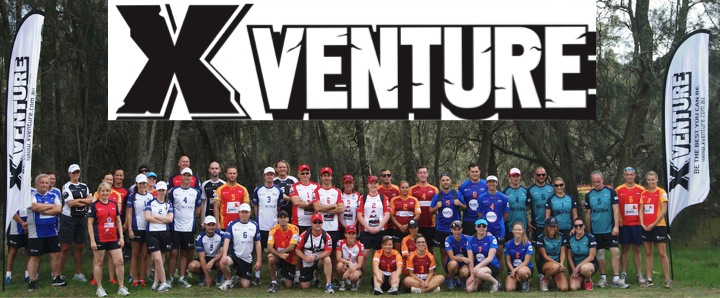
XVenture Challenge, February 2014
A day before the Challenge date on 21st February the XVenture team received two calls. One call came from the CEO of Good Design Australia, Dr Brandon Gien and one from the Founder of the Australian Institute of Clinical Hypnotherapy, Gordon Young. Both organisations are at the top of their tree, hold a high profile in their respective industries, and were participating in the 2-day Challenge for the first time. Unfortunately, for different reasons, both organisations were having difficulties in putting their six-person team together in time. A pragmatic solution emerged. Why not put the two organisations together for the Challenge? Both the CEOs agreed that this would be a good solution ,and so the next day their team members met for the first time. Competing in the Challenge with the “Good Institute” were PWC, GoodLife Health, Davco, Cargo and Logistics Management (Calm Logistics), Nickaz Constructions, The Works, and the National Centre of Indigenous Excellence.
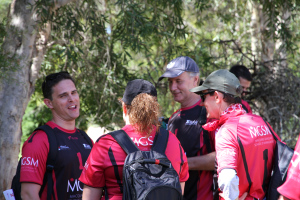
MGSM at their March XVenture Challenge
The XVenture Challenge is a World-class experiential learning program unlike any other. It was created to capture the essence of what really matters – people coming together, being together and achieving something special together. Built to test and encapsulate every dimension of business life, every decision, every skill, every sense and behaviour needed within a team environment, delivered both inside and outdoors and realising that every mistake is learning for the future. Those that experience the program are changed forever. In just a few months, the benchmark has been set on the standards of learning and growth for the future.
The program has been developed by a team of experts who have developed challenges for the best companies in the World as well as TV productions such as The Greatest Athlete and XVenture. The team also included executives with Board and global CEO experience, together with accredited team coaches and a clinically qualified team. The knowledge and skill to apply concepts relating to neuro plasticity and solution-oriented behavioural science is a fundamental and unique aspect of the program. The belief that when the self is calm and focused much more can be achieved, is also a critical element presented to the participants by the program leadership team.
In a two day challenge teams undertake nine diverse, fun and dynamic challenges with themes ranging from strategy development, creative thinking, active listening, quality management, marketing, presentation skills, risk taking, decision making under pressure, time management, knowledge sharing and effective communication.
Interspersed with written prompts and audio-visual messaging regarding teamwork and leadership themes, the team that wins the most XVenture dollars over the two days wins the game. It’s not an easy program. The pressure is from within the self, the team and competing against others.
To win this challenge isn’t easy. As well as the Good Institute team, other winning companies of the Challenges have included Nivea, MGSM and OzHarvest.
What was it about the Good Institute team that was different? Here’s a summary.
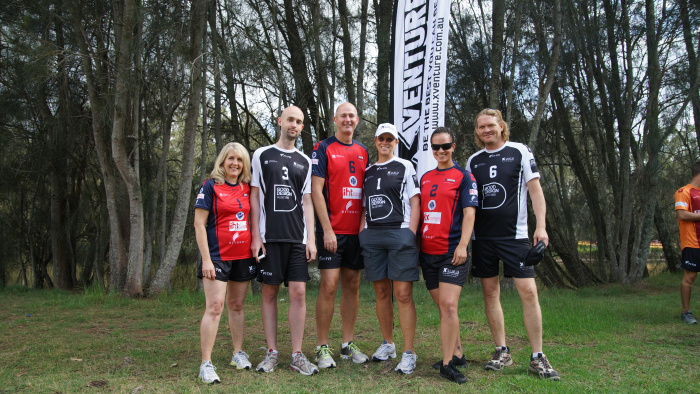
The ‘Good Institute’ – a team of six people who didn’t know each other won the February XVenture Challenge by 20%! How did this happen?
The team was made up of six people. Three men and three women: the CEO of Good Design Australia; an engineer, a graphic designer, a dental surgeon, a psychologist, and a life coach/body builder.
At the commencement of the program, the team got together and agreed a specific sense of purpose: to enjoy the experience and to learn from each other and with each other with no expectations other than improve on each challenge completed and follow the XVenture mantra – be the best you can be!
In the first challenge, they finished half way and had fun but didn’t stand out. We observed their attitude was one of enjoyment and debate about the mistakes they made rather than directing blame towards any of the individual team members. However, by the second challenge it appeared they had worked out something that the others hadn’t. They had identified very quickly the resources that each person had brought to the program in addition to the role that they would take. Such an important and fundamental aspect of great teamwork that most forget. Just because someone is an accountant, it doesn’t mean they’re not creative. Outside of work time, maybe they’re an expert in boating or using ropes or a photographer. This knowledge sharing, this openness is essential to building a great team. We have a habit of pigeon-holing people in our work place. From the second challenge on, the Good Institute ensured this didn’t happen. Their listening skills, their sense of mutual respect for each other was a joy to behold. Not to assume for a minute that the cohort of six were similar. Far from it. Different backgrounds and very different people. Their ability to focus on the challenge in front of them without distraction, consider options that were fit for purpose but without over thinking, then all commit to a solution was a fundamental.
For one challenge, they realised an engineering background was important, so they got behind their engineer who led them to success. Again, a significant lesson in teams. Leadership changes depending on the circumstances. CEOs and senior managers in particular need to allow members of their team to lead when they have skills to do so.
On another challenge, one member had a personal matter to attend to, so had a replacement available. The replacement just slotted in and there was no negative impact to the team at all. By the last challenge they were so far ahead, the race was on for second and third place.
We were so interested in the team dynamics we decided to undertake some more analysis. The XVenture team is accredited to use both Belbin and Team Management Systems (TMS). On this occasion, a full TMS analysis of the team was completed. Every member in the Good Institute completed a TMS questionnaire, which assessed their work preferences. The results support what was observed and captured on video.
TMS is built on the extensive research of Drs. Margerison and McCann, who created the Types of Work Wheel, which describes the critical types of work that all teams have to cover off on, to be effective. See below.

The research showed that teams, regardless of their size, function or industry, need to ensure all the eight key activities are completed, however how they do this is up to them, their environment and their goals.
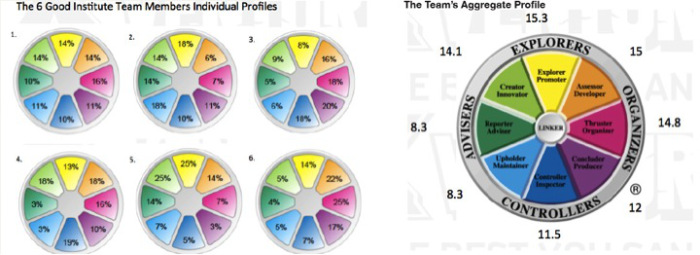
Several things were noticed.
The team’s aggregate score is very balanced. The team has every team preference area covered effectively. i.e. at least one participant has strength in each critical area. Team member 1 is particularly balanced and hence is likely to be a good “link person” within the team.
Despite the fact that there were very different personalities within the team (i.e. Both strong extroverts and introverts), the team’s aggregate scores demonstrated a real sense of balance. Couple this with the commitment and agreement to a set of team rules as described earlier, then this team has got every opportunity to achieve its goals.
The TMS RIDO scale, or model of interpersonal dynamics, looks at, not only the extroversion/introversion continuum, but also other critical preferences about how you like to work. It is not a black and white assessment, but takes into account the nuances of human behaviour and, when combined with the Types of Work Wheel as shown above, gives a very clear and holistic picture of individual behaviour.
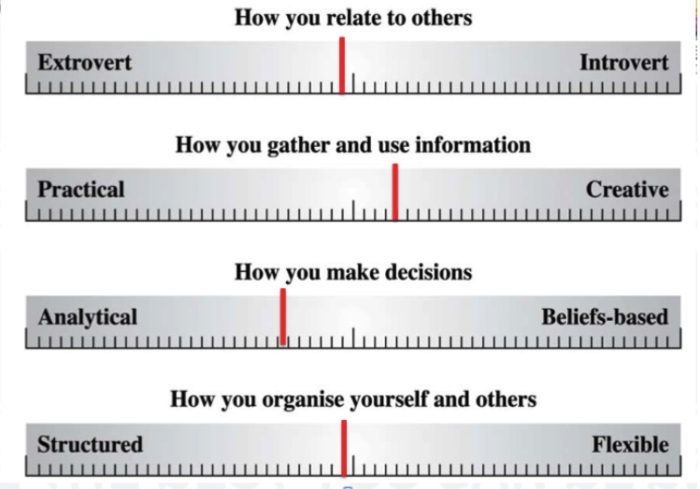
Conclusion
There is no question that this team was in the right time and right place. No one could have predicted that a team like this would have come together for an XVenture Challenge. That was a fluke! However, what isn’t a fluke is that a successful team needs a strong sense of purpose and commitment to a goal, an agreed culture of working, and a diverse group of people who can be very different and accepted for being so, but can cover all the aspects of what aspects of work make a good team.
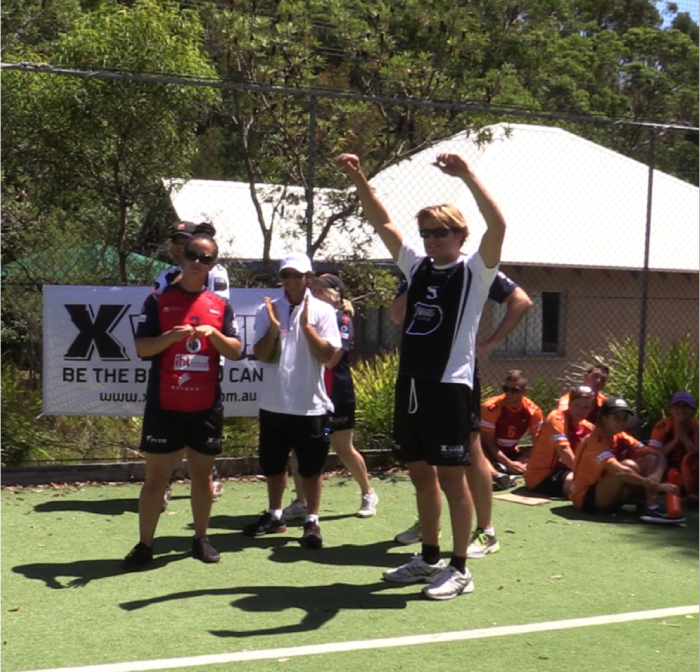
By Mike Conway Founder and CEO of XVenture © May 2014 (with thanks to TMS Australia)
Feel free to make contact with the author: to discuss this article or any other matter relating to XVenture: mike@xventure.com.au
Kick start your 2015 with participation in the ultimate team challenge – XVenture Challenge in February 2015! Click here for more details.